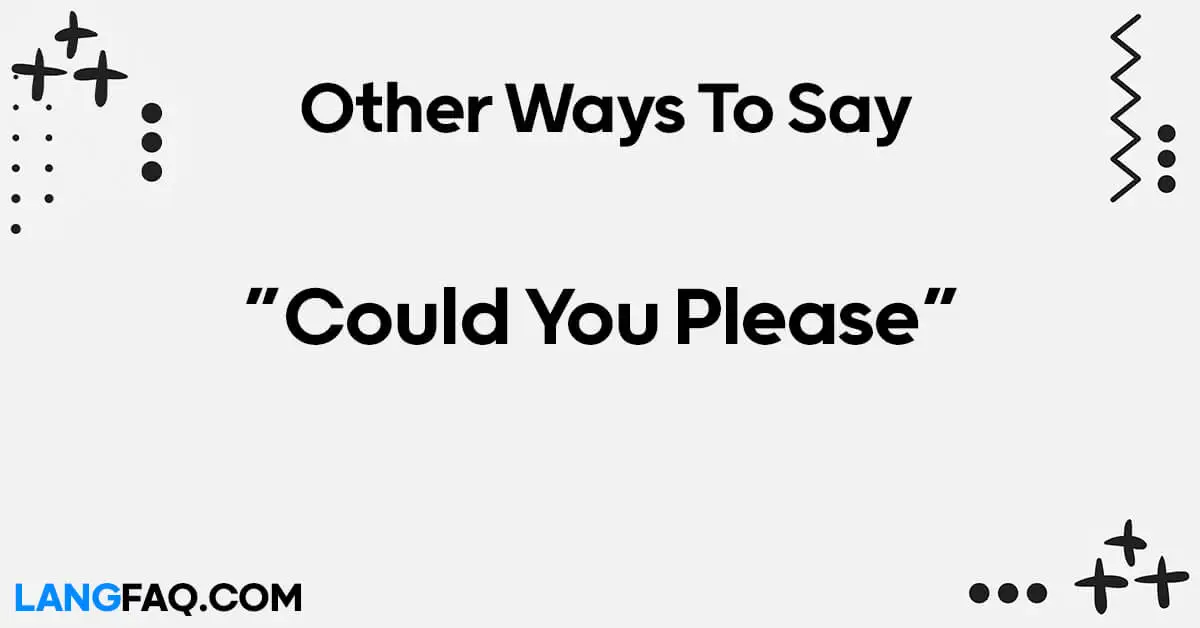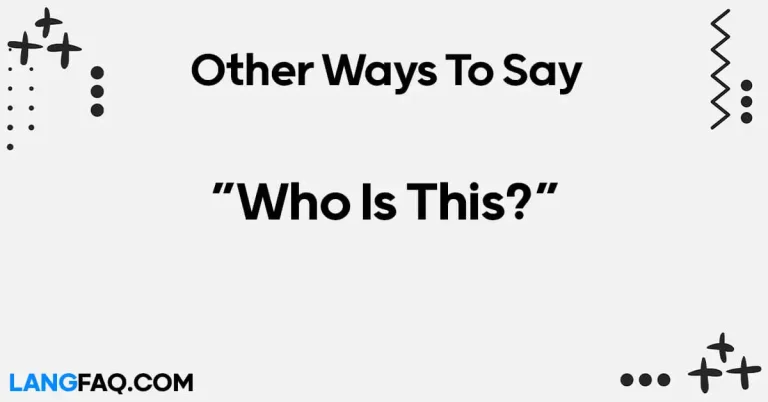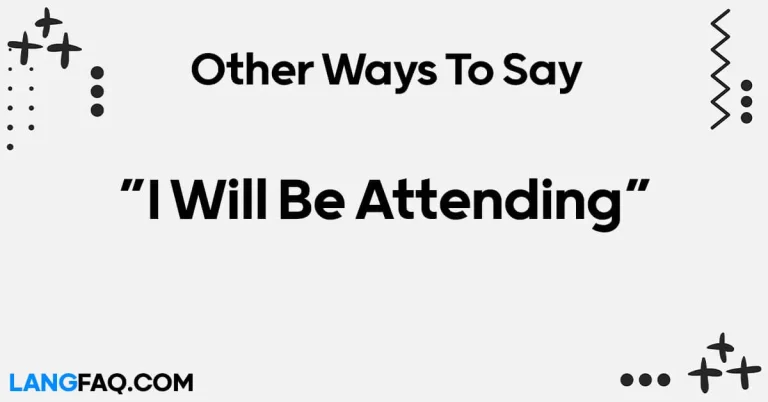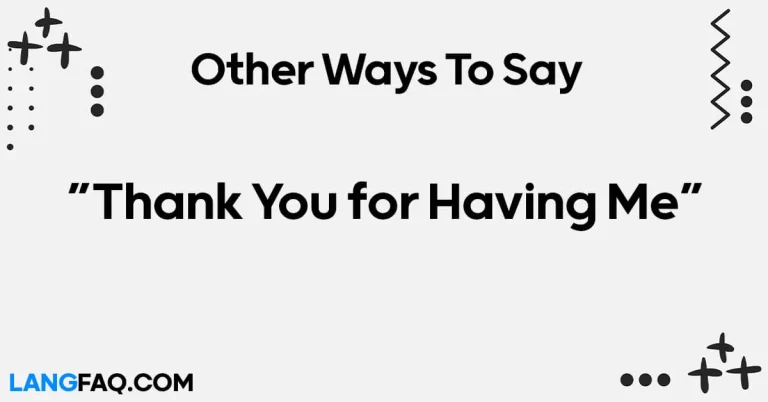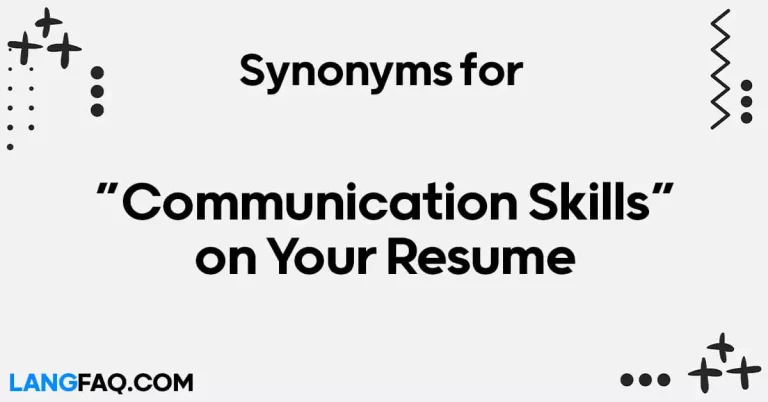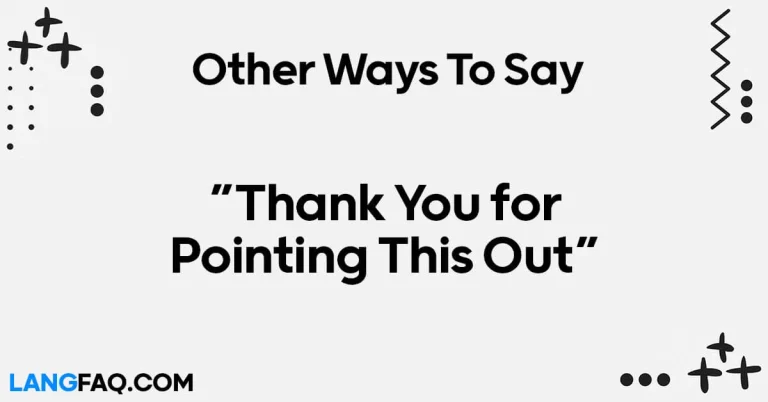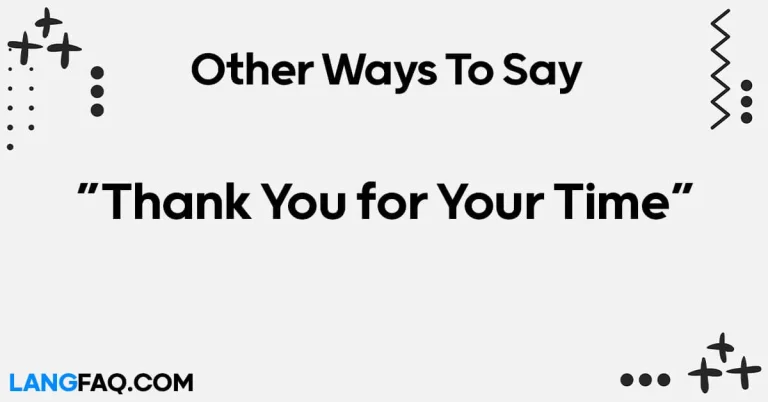Politeness is the hallmark of effective communication, and finding alternative ways to express requests politely can significantly enhance interpersonal interactions. In this article, we’ll delve into 12 creative alternatives to the common phrase “Could you please.” From casual to formal settings, these alternatives offer versatility and depth to your language repertoire, ensuring your requests are conveyed with finesse and courtesy.
12 Other Ways to Say “Could You Please”
Here are 12 other ways to say “Could you please”:
- Would you mind
- Might I ask
- Could I trouble you to
- May I request
- Would it be possible for you to
- Can you kindly
- Would you be so kind as to
- I wonder if you could
- Do you think you could
- Is it possible that you
- Might I trouble you for
- Would you graciously
Here’s the table with meanings and examples for the 12 other ways to say “Could you please”:
| Phrase | Meaning | Example |
|---|---|---|
| Would you mind…? | Polite way to ask for permission or assistance. | Would you mind passing me the salt, please? |
| Might I ask…? | Formal way to request information or assistance. | Might I ask for your opinion on this matter? |
| Could I trouble you to…? | Polite way to ask for a favor or assistance. | Could I trouble you to help me with this task? |
| May I request…? | Formal way to ask for something politely. | May I request your presence at the meeting? |
| Would it be possible for you to…? | Gentle way to inquire about feasibility. | Would it be possible for you to lend me a hand? |
| Can you kindly…? | Asking for something in a polite manner. | Can you kindly provide me with your feedback? |
| Would you be so kind as to…? | Formal way to make a polite request. | Would you be so kind as to hold the door? |
| I wonder if you could…? | Gentle way to ask for assistance or information. | I wonder if you could assist me with this task? |
| Do you think you could…? | Asking for someone’s capability or willingness. | Do you think you could pick me up later? |
| Is it possible that you…? | Inquiring about the feasibility of a request. | Is it possible that you could help me out? |
| Might I trouble you for…? | Polite way to request something from someone. | Might I trouble you for a moment of your time? |
| Would you graciously…? | Polite way to ask for something with grace. | Would you graciously consider my request? |
These alternative phrases offer a range of polite ways to ask for assistance or permission in various situations, enhancing communication and fostering positive interactions. By incorporating these expressions into your language repertoire, you can convey your requests with courtesy and consideration.
Is It Correct to Say “Could You Please”?
Yes, it is correct to say “Could you please.” This phrase is commonly used to make polite requests or ask someone to do something in a courteous manner. “Could” is the past tense of “can,” indicating the possibility or capability of performing the requested action. “You” refers to the person being addressed, and “please” adds politeness and emphasis to the request.
“Could you please” is often used in formal and informal contexts, such as in workplaces, schools, social interactions, and everyday conversations. It conveys respect for the other person’s time and willingness to assist without sounding too demanding or authoritative.
Example sentences using “Could you please” include:
- “Could you please pass me the salt?”
- “Could you please send me the report by the end of the day?”
- “Could you please turn off the lights before leaving?”
Overall, “Could you please” is a polite and widely accepted way to make requests or ask for assistance in various situations.
Professional Mail Example With “Could You Please”
Subject: Request for Assistance with Project Deadline
Dear [Recipient’s Name],
I hope this email finds you well. I am writing to request your assistance with an urgent matter regarding our upcoming project deadline.
Could you please review the attached project timeline and provide your feedback at your earliest convenience? Your expertise and insights are crucial to ensuring the successful completion of this project within the specified timeframe.
Additionally, if there are any potential challenges or obstacles that you foresee, could you please advise on how we can address them effectively?
Your prompt attention to this matter would be greatly appreciated, as we aim to finalize the project plan as soon as possible to meet our deadlines.
Thank you in advance for your cooperation and support.
Best regards, [Your Name]
1. Would you mind
Explanation: “Would you mind” is a polite way to ask for permission or assistance without sounding too demanding. It shows consideration for the other person’s feelings and willingness to accommodate their preferences.
Usage Scenarios:
- Formal: In a professional setting, such as a workplace or business meeting, you can use “Would you mind” to make requests politely. For example, “Would you mind reviewing this report before the meeting?”
- Informal: Among friends or family, “Would you mind” can still be used to ask for favors in a considerate manner. For instance, “Would you mind picking up some groceries on your way home?”
Example Sentence: “Would you mind lending me your notes for the presentation tomorrow?”
Variations:
- “Do you mind if I…?”
- “Would you mind terribly if…?”
Dictionary Insights: According to Cambridge Dictionary, “Would you mind” is used to politely ask someone to do something or to politely ask for permission to do something.
Related Grammar/Usage Rules: “Would you mind” is typically followed by a verb in the -ing form. For example, “Would you mind helping me with this project?”
Tips:
- Use “Would you mind” followed by a verb + -ing to make polite requests.
- Pair it with “if” or “terribly” for added politeness.
Pros and Cons:
- Pros: It’s a versatile and widely accepted way to make polite requests. It shows respect for the other person’s feelings.
- Cons: In very formal situations, it might sound overly cautious or deferential.
Email Sample:
Subject: Request for Assistance
Dear [Recipient’s Name],
I hope this email finds you well. Would you mind taking a moment to review the attached document? Your feedback would be greatly appreciated. Thank you in advance for your help.
Best regards, [Your Name]
2. Might I ask
Explanation: “Might I ask” is a formal and courteous way to seek information or assistance. It conveys respect for the other person’s knowledge or expertise.
Usage Scenarios:
- Formal: In professional or academic settings, such as during a meeting or presentation, you can use “Might I ask” to pose questions respectfully. For example, “Might I ask for clarification on this point?”
- Mentor-Mentee Context: In a mentorship relationship, the mentee might use “Might I ask” to seek guidance or advice from their mentor. For instance, “Might I ask for your insights on how to approach this project?”
Example Sentence: “Might I ask for your opinion on the new marketing strategy?”
Variations:
- “May I ask…?”
- “Could I ask…?”
Dictionary Insights: According to Merriam-Webster, “Might I ask” is a polite way to introduce a question or request.
Related Grammar/Usage Rules: “Might I ask” is followed by the main verb (infinitive) without “to.” For example, “Might I ask for your assistance?”
Tips:
- Use “Might I ask” to demonstrate respect and deference in formal situations.
- Pair it with a specific question or request for clarity.
Pros and Cons:
- Pros: It conveys politeness and deference, particularly in formal contexts.
- Cons: It may sound overly formal in casual conversations, so use it appropriately.
Email Sample:
Subject: Inquiry Regarding Project Timeline
Dear [Recipient’s Name],
I hope this email finds you well. Might I ask for an update on the timeline for the upcoming project? Your insights would be invaluable as we plan our next steps. Thank you for your attention to this matter.
Best regards, [Your Name]
3. Could I trouble you to
Explanation: “Could I trouble you to” acknowledges the potential imposition of the request while still seeking assistance politely. It shows consideration for the other person’s time and effort.
Usage Scenarios:
- Professional Setting: In a workplace environment, you can use “Could I trouble you to” to request assistance with tasks or projects. For example, “Could I trouble you to proofread this document for me?”
- Informal Setting: Among friends or acquaintances, “Could I trouble you to” can be used humorously to request small favors without sounding too serious. For instance, “Could I trouble you to pass the salt?”
Example Sentence: “Could I trouble you to provide feedback on my presentation slides?”
Variations:
- “Would it be too much trouble to…?”
- “May I impose upon you to…?”
Dictionary Insights: According to Collins Dictionary, “Could I trouble you to” is used to ask someone to do something, especially when you are embarrassed about it or when you know that it is not their responsibility.
Related Grammar/Usage Rules: “Could I trouble you to” is followed by the verb (infinitive) without “to.” For example, “Could I trouble you to lend me a hand?”
Tips:
- Use “Could I trouble you to” when you’re aware that your request might inconvenience the other person.
- Pair it with a specific request to be clear about what you need.
Pros and Cons:
- Pros: It acknowledges the potential imposition of the request, showing consideration for the other person.
- Cons: It might sound overly formal in very casual situations, so use it appropriately.
Email Sample:
Subject: Request for Assistance with Project
Dear [Recipient’s Name],
I hope you’re doing well. Could I trouble you to review the attached document and provide your feedback by the end of the day? Your input would be greatly appreciated. Thank you for your assistance.
Best regards, [Your Name]
4. May I request
Explanation: “May I request” is a polite and formal way to ask for something or make a suggestion. It shows respect for the other person’s authority or willingness to assist.
Usage Scenarios:
- Formal Setting: In professional or official contexts, such as business meetings or correspondence, you can use “May I request” to make formal requests or proposals. For example, “May I request a copy of the agenda for the upcoming meeting?”
- Mentorship Context: In a mentorship or coaching relationship, the mentee might use “May I request” to seek guidance or support from their mentor. For instance, “May I request your advice on how to improve my presentation skills?”
Example Sentence: “May I request your presence at the board meeting next week?”
Variations:
- “Could I request…?”
- “Would it be possible to…?”
Dictionary Insights: According to Oxford Learner’s Dictionaries, “May I request” is used to ask politely for something.
Related Grammar/Usage Rules: “May I request” is typically followed by a noun phrase or a verb phrase. For example, “May I request your assistance?” or “May I request that you review this document?”
Tips:
- Use “May I request” to convey formality and respect in professional or formal situations.
- Be clear and specific about what you’re requesting or suggesting.
Pros and Cons:
- Pros: It’s a formal and respectful way to make requests or suggestions, suitable for professional settings.
- Cons: It might sound too formal or stiff in casual conversations, so use it appropriately.
Email Sample:
Subject: Formal Request for Meeting Attendance
Dear [Recipient’s Name],
I hope this email finds you well. May I request your presence at the quarterly review meeting scheduled for next Tuesday? Your input and insights would be invaluable as we discuss our performance and future goals. Thank you for considering my request.
Best regards, [Your Name]
5. Would it be possible for you to
Explanation: “Would it be possible for you to” is a diplomatic way to inquire about the feasibility of a request. It allows for flexibility and negotiation while maintaining a polite tone.
Usage Scenarios:
- Formal Request: In professional or formal settings, such as business communications or meetings, you can use “Would it be possible for you to” to make requests politely. For example, “Would it be possible for you to provide a status update on the project?”
- Casual Inquiry: In everyday conversations, you can use “Would it be possible for you to” to ask for favors or assistance without sounding too demanding. For instance, “Would it be possible for you to pick up some coffee on your way here?”
Example Sentence: “Would it be possible for you to extend the deadline for submission?”
Variations:
- “Is there any chance you could…?”
- “Could you possibly…?”
Dictionary Insights: According to Merriam-Webster, “Would it be possible for you to” is a polite way to ask if something is achievable or doable.
Related Grammar/Usage Rules: “Would it be possible for you to” is followed by a verb phrase or noun phrase. For example, “Would it be possible for you to attend the meeting?” or “Would it be possible for you to assist with this task?”
Tips:
- Use “Would it be possible for you to” to inquire about someone’s willingness or ability to fulfill a request.
- Be prepared to offer alternatives or compromises if the request is not feasible.
Pros and Cons:
- Pros: It allows for flexibility and negotiation while maintaining a polite tone.
- Cons: It might sound slightly formal in very casual situations, so use it appropriately.
Email Sample:
Subject: Request for Deadline Extension
Dear [Recipient’s Name],
I hope this email finds you well. Would it be possible for you to consider extending the deadline for the project by a few days? We’ve encountered some unexpected challenges, and additional time would greatly assist us in delivering quality work. Thank you for your consideration.
Best regards, [Your Name]
6. Can you kindly
Explanation: “Can you kindly” is a straightforward yet polite way to ask for assistance or information. It combines the informality of “can” with the politeness of “kindly” to convey respect and consideration.
Usage Scenarios:
- Informal Request: In casual or informal settings, such as among friends or acquaintances, you can use “Can you kindly” to ask for favors or help. For example, “Can you kindly lend me your charger?”
- Professional Inquiry: In workplace communications or interactions, “Can you kindly” can be used to make requests politely without sounding too formal. For instance, “Can you kindly provide an update on the project status?”
Example Sentence: “Can you kindly share your expertise on this topic?”
Variations:
- “Could you please…?”
- “Would you mind…?”
Dictionary Insights: According to Cambridge Dictionary, “Can you kindly” is used to ask someone to do something in a polite way.
Related Grammar/Usage Rules: “Can you kindly” is followed by a verb phrase or a noun phrase. For example, “Can you kindly assist with this task?” or “Can you kindly provide your feedback?”
Tips:
- Use “Can you kindly” to make polite requests in both informal and formal contexts.
- Pair it with a specific request to be clear about what you need.
Pros and Cons:
- Pros: It’s a versatile and widely accepted way to make polite requests.
- Cons: In very formal situations, it might sound overly casual, so use it appropriately.
Email Sample:
Subject: Request for Assistance with Presentation
Hi [Recipient’s Name],
I hope you’re doing well. Can you kindly spare some time to review my presentation slides and provide your feedback? Your insights would be invaluable as I prepare for the upcoming meeting. Thank you for your help.
Best regards, [Your Name]
7. Would you be so kind as to
Explanation: “Would you be so kind as to” is an elegant and formal way to make requests or ask for assistance. It emphasizes the other person’s generosity and willingness to help.
Usage Scenarios:
- Professional Request: In formal or professional settings, such as business meetings or correspondence, you can use “Would you be so kind as to” to make polite requests. For example, “Would you be so kind as to share your expertise on this topic?”
- Formal Favor: In more formal interactions, such as with acquaintances or colleagues, “Would you be so kind as to” can be used to request assistance or favors gracefully. For instance, “Would you be so kind as to accompany me to the networking event?”
Example Sentence: “Would you be so kind as to forward me the meeting agenda?”
Variations:
- “Would you mind terribly…?”
- “Could I trouble you to…?”
Dictionary Insights: According to Merriam-Webster, “Would you be so kind as to” is used to ask someone to do something in a polite way, especially when you are making a big request.
Related Grammar/Usage Rules: “Would you be so kind as to” is followed by a verb phrase or a noun phrase. For example, “Would you be so kind as to assist with this task?” or “Would you be so kind as to provide your input?”
Tips:
- Use “Would you be so kind as to” in formal contexts to convey respect and appreciation.
- Be sincere and gracious in your tone when making requests.
Pros and Cons:
- Pros: It emphasizes the other person’s generosity and willingness to assist.
- Cons: It might sound overly formal in very casual situations, so use it appropriately.
Email Sample:
Subject: Request for Collaboration
Dear [Recipient’s Name],
I trust this email finds you well. Would you be so kind as to consider collaborating on the upcoming project? Your expertise and insights would undoubtedly enhance the final outcome. Thank you for considering my proposal.
Warm regards, [Your Name]
8. I wonder if you could
Explanation: “I wonder if you could” is a polite and indirect way to make requests or inquiries. It expresses curiosity or uncertainty while seeking assistance or information.
Usage Scenarios:
- Casual Inquiry: In everyday conversations, such as with friends or family members, you can use “I wonder if you could” to ask for help or advice without sounding too formal. For example, “I wonder if you could help me move this furniture?”
- Professional Inquiry: In workplace communications or interactions, “I wonder if you could” can be used to make requests politely while acknowledging the other person’s expertise. For instance, “I wonder if you could clarify the next steps for this project?”
Example Sentence: “I wonder if you could provide some guidance on this matter?”
Variations:
- “I was wondering if you could…?”
- “Do you think you could…?”
Dictionary Insights: According to Oxford Learner’s Dictionaries, “I wonder if you could” is used to ask somebody politely if they can do something or if they know something.
Related Grammar/Usage Rules: “I wonder if you could” is followed by a verb phrase or a noun phrase. For example, “I wonder if you could assist with this task?” or “I wonder if you could share your insights?”
Tips:
- Use “I wonder if you could” to make indirect requests or inquiries politely.
- Be respectful and considerate of the other person’s time and effort.
Pros and Cons:
- Pros: It’s a polite and indirect way to make requests or inquiries.
- Cons: It might sound overly cautious or hesitant in very assertive situations, so use it appropriately.
Email Sample:
Subject: Inquiry Regarding Project Status
Hi [Recipient’s Name],
I hope you’re doing well. I wonder if you could provide an update on the status of the project? Your insights would be greatly appreciated as we move forward with our plans. Thank you for your attention to this matter.
Best regards, [Your Name]
9. Do you think you could
Explanation: “Do you think you could” is a straightforward and friendly way to make requests or ask for assistance. It invites collaboration and cooperation while maintaining a polite tone.
Usage Scenarios:
- Collaborative Request: In group settings or team environments, you can use “Do you think you could” to ask for help or support from others. For example, “Do you think you could assist with setting up the event?”
- Personal Favor: In one-on-one interactions, such as with friends or acquaintances, “Do you think you could” can be used to request small favors or assistance. For instance, “Do you think you could give me a ride to the airport?”
Example Sentence: “Do you think you could provide some feedback on my presentation?”
Variations:
- “Would you be able to…?”
- “Can you please…?”
Dictionary Insights: According to Collins Dictionary, “Do you think you could” is used to ask someone politely if they are able to do something, or if it is possible to do something.
Related Grammar/Usage Rules: “Do you think you could” is followed by a verb phrase or a noun phrase. For example, “Do you think you could help with this task?” or “Do you think you could share your expertise?”
Tips:
- Use “Do you think you could” to make requests or ask for assistance in a friendly and approachable manner.
- Be specific and clear about what you’re asking for to avoid confusion.
Pros and Cons:
- Pros: It’s a friendly and collaborative way to make requests or ask for assistance.
- Cons: It might sound slightly informal in very formal situations, so use it appropriately.
Email Sample:
Subject: Request for Collaboration on Project
Dear [Recipient’s Name],
I hope this email finds you well. Do you think you could spare some time to collaborate on the upcoming project? Your expertise and insights would be invaluable as we work towards our goals. Thank you for considering my request.
Best regards, [Your Name]
10. Is it possible that you
Explanation: “Is it possible that you” is a gentle and diplomatic way to inquire about the feasibility of a request. It allows for flexibility and negotiation while maintaining a polite tone.
Usage Scenarios:
- Diplomatic Inquiry: In professional or formal settings, such as business meetings or correspondence, you can use “Is it possible that you” to inquire about someone’s willingness or ability to fulfill a request. For example, “Is it possible that you could provide a brief overview of the project?”
- Casual Inquiry: In everyday conversations, such as with friends or acquaintances, “Is it possible that you” can be used to ask for assistance or favors without sounding too demanding. For instance, “Is it possible that you could lend me your umbrella?”
Example Sentence: “Is it possible that you could assist with organizing the event?”
Variations:
- “Would it be feasible for you to…?”
- “Could you perhaps…?”
Dictionary Insights: According to Merriam-Webster, “Is it possible that you” is used to ask if something is achievable or doable in a polite way.
Related Grammar/Usage Rules: “Is it possible that you” is followed by a verb phrase or a noun phrase. For example, “Is it possible that you could attend the meeting?” or “Is it possible that you could provide your input?”
Tips:
- Use “Is it possible that you” to inquire about someone’s willingness or ability to fulfill a request politely.
- Be prepared to offer alternatives or compromises if the request is not feasible.
Pros and Cons:
- Pros: It allows for flexibility and negotiation while maintaining a polite tone.
- Cons: It might sound slightly formal in very casual situations, so use it appropriately.
Email Sample:
Subject: Inquiry Regarding Availability for Meeting
Dear [Recipient’s Name],
I hope this email finds you well. Is it possible that you could attend the upcoming team meeting on Friday? Your presence and insights would be greatly appreciated as we discuss our plans for the next quarter. Thank you for considering my request.
Best regards, [Your Name]
11. Might I trouble you for
Explanation: “Might I trouble you for” acknowledges the potential imposition of the request while still seeking assistance politely. It shows consideration for the other person’s time and effort.
Usage Scenarios:
- Professional Setting: In a workplace environment, you can use “Might I trouble you for” to request assistance with tasks or projects. For example, “Might I trouble you for some advice on this matter?”
- Informal Setting: Among friends or acquaintances, “Might I trouble you for” can be used humorously to request small favors without sounding too serious. For instance, “Might I trouble you for a ride to the airport?”
Example Sentence: “Might I trouble you for your opinion on this matter?”
Variations:
- “Would you mind terribly…?”
- “Could I impose upon you to…?”
Dictionary Insights: According to Cambridge Dictionary, “Might I trouble you for” is used to ask someone to do something, especially when you are embarrassed about it or when you know that it is not their responsibility.
Related Grammar/Usage Rules: “Might I trouble you for” is followed by a verb phrase or a noun phrase. For example, “Might I trouble you for your assistance?” or “Might I trouble you for a moment of your time?”
Tips:
- Use “Might I trouble you for” when you’re aware that your request might inconvenience the other person.
- Pair it with a specific request to be clear about what you need.
Pros and Cons:
- Pros: It acknowledges the potential imposition of the request, showing consideration for the other person.
- Cons: It might sound overly formal in very casual situations, so use it appropriately.
Email Sample:
Subject: Request for Assistance with Project
Dear [Recipient’s Name],
I hope you’re doing well. Might I trouble you for your assistance with the upcoming project? Your expertise and insights would be invaluable as we work towards our goals. Thank you for considering my request.
Best regards, [Your Name]
12. Would you graciously
Explanation: “Would you graciously” is a polite and respectful way to ask for something with grace and appreciation. It conveys gratitude and acknowledges the other person’s willingness to assist.
Usage Scenarios:
- Professional Request: In formal or professional settings, such as business meetings or correspondence, you can use “Would you graciously” to make requests politely. For example, “Would you graciously consider extending the deadline for this project?”
- Formal Favor: In more formal interactions, such as with acquaintances or colleagues, “Would you graciously” can be used to request assistance or favors gracefully. For instance, “Would you graciously offer your support for this initiative?”
Example Sentence: “Would you graciously share your insights on this topic?”
Variations:
- “Could I humbly request…?”
- “Would you be so kind as to…?”
Dictionary Insights: According to Collins Dictionary, “Would you graciously” is used to ask someone politely if they can do something or if they know something, especially when you are making a big request.
Related Grammar/Usage Rules: “Would you graciously” is followed by a verb phrase or a noun phrase. For example, “Would you graciously assist with this task?” or “Would you graciously provide your input?”
Tips:
- Use “Would you graciously” to convey gratitude and appreciation while making requests or inquiries.
- Be sincere and gracious in your tone to show respect for the other person.
Pros and Cons:
- Pros: It emphasizes gratitude and respect, fostering positive interactions.
- Cons: It might sound overly formal in very casual situations, so use it appropriately.
Email Sample:
Subject: Request for Assistance with Proposal
Dear [Recipient’s Name],
I trust this email finds you well. Would you graciously consider reviewing the proposal I’ve attached? Your expertise and insights would be greatly appreciated as we finalize our plans. Thank you for your consideration.
Warm regards, [Your Name]
FAQs
- How can I make a polite request without using “Could you please”? Employ phrases like “Would you mind,” “May I ask you to,” or “Would it be possible to” to make polite requests in various contexts.
- Are these alternatives suitable for formal situations? Yes, many of these alternatives, such as “May I ask you to” or “Would you be so kind as to,” are appropriate for formal settings.
- What if I want to sound more casual? Opt for phrases like “Would you be able to,” “Do you think you could,” or “If you wouldn’t mind” for a more casual tone.
- Can I mix these phrases in one request? While it’s possible, it’s essential to maintain coherence and clarity in your communication. Use phrases that align with the tone and context of your request.
- How do I express gratitude for someone’s assistance? You can say, “Thank you for your help” or “I appreciate your assistance” to express gratitude after someone fulfills your request.
- What if someone declines my request? Respect their decision gracefully and thank them for considering your request. You can also inquire if there’s an alternative solution or offer to reciprocate their kindness in the future.
Conclusion
Enhancing your language skills involves more than just vocabulary; it’s about understanding nuances and employing appropriate expressions in various situations. By incorporating these 12 alternatives to “Could you please” into your conversations, you’ll not only convey your requests more effectively but also demonstrate thoughtfulness and respect towards others.

